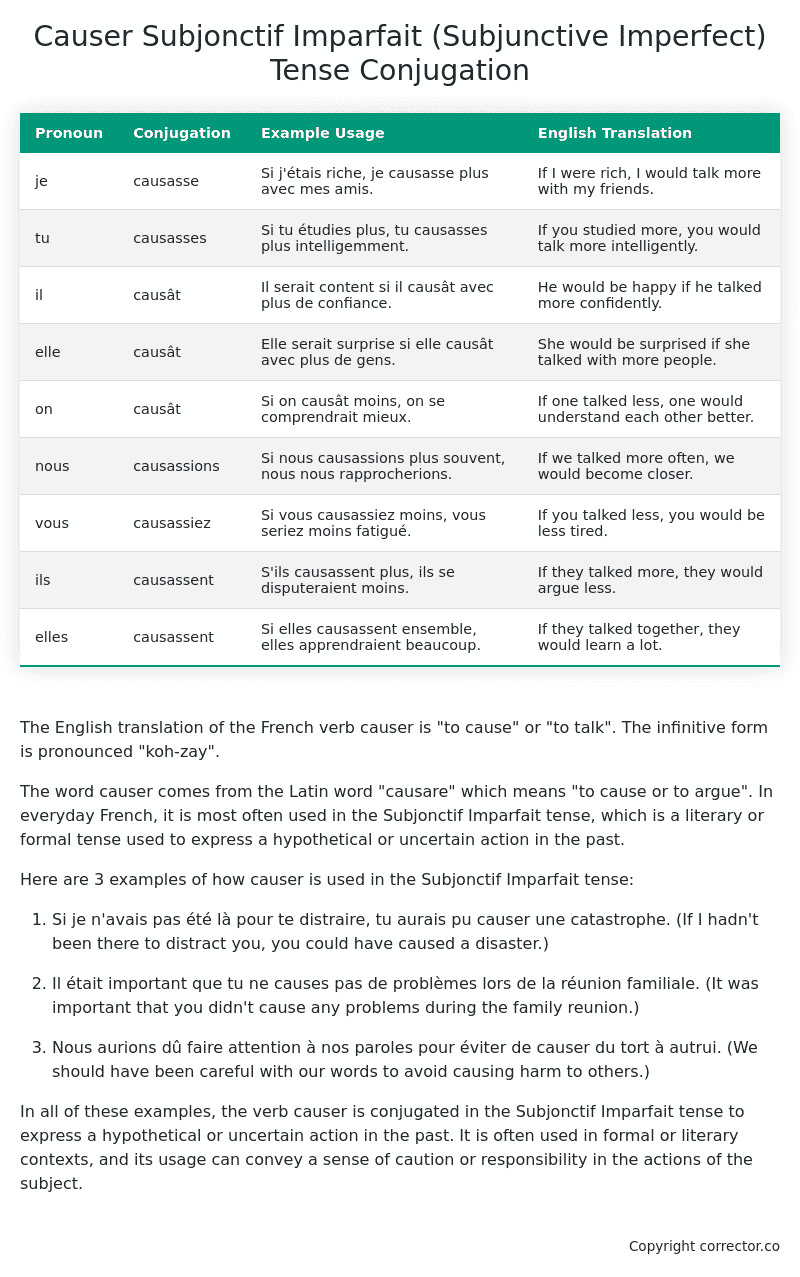Subjonctif Imparfait (Subjunctive Imperfect) Tense Conjugation of the French Verb causer
Introduction to the verb causer
The English translation of the French verb causer is “to cause” or “to talk”. The infinitive form is pronounced “koh-zay”.
The word causer comes from the Latin word “causare” which means “to cause or to argue”. In everyday French, it is most often used in the Subjonctif Imparfait tense, which is a literary or formal tense used to express a hypothetical or uncertain action in the past.
Here are 3 examples of how causer is used in the Subjonctif Imparfait tense:
-
Si je n’avais pas été là pour te distraire, tu aurais pu causer une catastrophe. (If I hadn’t been there to distract you, you could have caused a disaster.)
-
Il était important que tu ne causes pas de problèmes lors de la réunion familiale. (It was important that you didn’t cause any problems during the family reunion.)
-
Nous aurions dû faire attention à nos paroles pour éviter de causer du tort à autrui. (We should have been careful with our words to avoid causing harm to others.)
In all of these examples, the verb causer is conjugated in the Subjonctif Imparfait tense to express a hypothetical or uncertain action in the past. It is often used in formal or literary contexts, and its usage can convey a sense of caution or responsibility in the actions of the subject.
Table of the Subjonctif Imparfait (Subjunctive Imperfect) Tense Conjugation of causer
| Pronoun | Conjugation | Example Usage | English Translation |
|---|---|---|---|
| je | causasse | Si j’étais riche, je causasse plus avec mes amis. | If I were rich, I would talk more with my friends. |
| tu | causasses | Si tu étudies plus, tu causasses plus intelligemment. | If you studied more, you would talk more intelligently. |
| il | causât | Il serait content si il causât avec plus de confiance. | He would be happy if he talked more confidently. |
| elle | causât | Elle serait surprise si elle causât avec plus de gens. | She would be surprised if she talked with more people. |
| on | causât | Si on causât moins, on se comprendrait mieux. | If one talked less, one would understand each other better. |
| nous | causassions | Si nous causassions plus souvent, nous nous rapprocherions. | If we talked more often, we would become closer. |
| vous | causassiez | Si vous causassiez moins, vous seriez moins fatigué. | If you talked less, you would be less tired. |
| ils | causassent | S’ils causassent plus, ils se disputeraient moins. | If they talked more, they would argue less. |
| elles | causassent | Si elles causassent ensemble, elles apprendraient beaucoup. | If they talked together, they would learn a lot. |
Other Conjugations for Causer.
Le Present (Present Tense) Conjugation of the French Verb causer
Imparfait (Imperfect) Tense Conjugation of the French Verb causer
Passé Simple (Simple Past) Tense Conjugation of the French Verb causer
Passé Composé (Present Perfect) Tense Conjugation of the French Verb causer
Futur Simple (Simple Future) Tense Conjugation of the French Verb causer
Futur Proche (Near Future) Tense Conjugation of the French Verb causer
Plus-que-parfait (Pluperfect) Tense Conjugation of the French Verb causer
Passé Antérieur (Past Anterior) Tense Conjugation of the French Verb causer
Futur Antérieur (Future Anterior) Tense Conjugation of the French Verb causer
Subjonctif Présent (Subjunctive Present) Tense Conjugation of the French Verb causer
Subjonctif Passé (Subjunctive Past) Tense Conjugation of the French Verb causer
Subjonctif Imparfait (Subjunctive Imperfect) Tense Conjugation of the French Verb causer (this article)
Subjonctif Plus-que-parfait (Subjunctive Pluperfect) Tense Conjugation of the French Verb causer
Conditionnel Présent (Conditional Present) Tense Conjugation of the French Verb causer
Conditionnel Passé (Conditional Past) Tense Conjugation of the French Verb causer
L’impératif Présent (Imperative Present) Tense Conjugation of the French Verb causer
L’infinitif Présent (Infinitive Present) Tense Conjugation of the French Verb causer
Struggling with French verbs or the language in general? Why not use our free French Grammar Checker – no registration required!
Get a FREE Download Study Sheet of this Conjugation 🔥
Simply right click the image below, click “save image” and get your free reference for the causer Subjonctif Imparfait tense conjugation!

Causer – About the French Subjonctif Imparfait (Subjunctive Imperfect) Tense
Formation
Common Everyday Usage Patterns
Interactions with Other Tenses
Subjonctif Présent
Indicatif Passé Composé
Conditional
Conditional Perfect
Summary
I hope you enjoyed this article on the verb causer. Still in a learning mood? Check out another TOTALLY random French verb conjugation!


